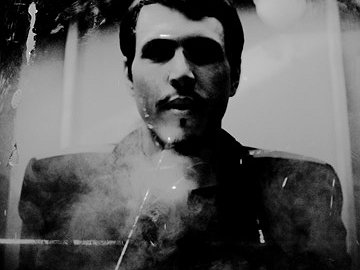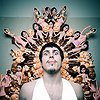In the beginning...
Like his music, Schirach's fan base is genre-busting, his performances are famous for attracting a wide range of sub-cultures and social groups. Not willing to submit to stereotyping, Otto von Schirach describes his music as a combination of Earth Wave Surf Electro Bass Tropical calypso Dubstep Broken Noise Grind, IDM Folk Glitch, Breakcore and orchestral Gabber. Part Cuban, part German, part mystic, Schirach identifies with the music native to his home town Miami and makes music with and for a variety of other Miami-based musicians and artists.
When did you start writing/producing music - and what or who were your early passions and influences?
I started writing music in 1990 when I was 12. I was into classical, Miami Bass, Freestyle, and Afro Cuban Santeria. This was what my parents listened to, but shortly after I got into Childrens’ records.
What do you personally consider to be the incisive moments in your artistic work and/or career?
I’d say one was when I was 14 and I was able to sample my chicken farting. Another was when I was 20 and learned about wave table distortion.
What are currently your main compositional- and production-challenges?
The fine balance of not destroying and destroying a sound/piece.
What do you usually start with when working on a new piece?
It is different every time. Sometimes it is a microwave pizza and others it is vocals.
How strictly do you separate improvising and composing?
It depends on the earth’s atmosphere, sometimes earth shoots me in different directions.
How do you see the relationship between sound, space and composition?
The universe creates everything.
Do you feel it important that an audience is able to deduct the processes and ideas behind a work purely on the basis of the music? If so, how do you make them transparent?
I am extremely happy when humans or non humans use their brain, but on the other hand I am also extremely happy when they do not.
In how much, do you feel, are creative decisions shaped by cultural differences – and in how much, vice versa, is the perception of sound influenced by cultural differences?
When I was younger I never toured and never really played in front of an audience. I made music for my friends and we would just sit there and bug out on the madness and mania of the sound waves. In 2001 when I released my first album it created a buzz. I then toured it and realized that the music needed to change a bit for a live show and to let humans understand it.
The relationship between music and other forms of art – painting, video art and cinema most importantly - has become increasingly important. How do you see this relationship yourself and in how far, do you feel, does music relate to other senses than hearing alone?
When I write a song I usually visualize the whole song as a movie or a scene.
There seem to be two fundamental tendencies in music today: On the one hand, a move towards complete virtualisation, where tracks and albums are merely released as digital files. And, on the other, an even closer union between music, artwork, packaging and physical presentation. Where do you stand between these poles?
I let the music guide me. If it wants to materialize into a packaging with artwork, it will do so on its own. If the music wants to be magic that is just digital on its own then it will find its home.
The role of an artist is always subject to change. What's your view on the (e.g. political/social/creative) tasks of artists today and how do you try to meet these goals in your work?
I’m a Miami Latino Gangster.
Music-sharing sites and -blogs as well as a flood of releases in general are presenting both listeners and artists with challenging questions. What's your view on the value of music today? In what way does the abundance of music change our perception of it?
Music is flooded and now with McDonalds making apps so that you can make beats it definitely brings tears to my eyes. The gold will shine through and the light will out shine the Starbucks apps or the iphone apps that are pre-programmed and brainwashed.
How, would you say, could non-mainstream forms of music reach wider audiences?
Telepathy
Usually, it is considered that it is the job of the artist to win over an audience. But listening is also an active, rather than just a passive process. How do you see the role of the listener in the musical communication process?
Their ear is connected to the third eye so I inject audio sound waves to enlighten their third eye.
Reaching audiences usually involves reaching out to the press and possibly working with a PR company. What's your perspective on the promo system? In which way do music journalism and PR companies change the way music is perceived by the public?
A good press person will roll you into the hype bandwagon, but if they really believe in your record the sky is limitless.
Please recommend two artists to our readers which you feel deserve their attention.
Dino Felipe
Banana Sloth
Baseck
Read and hear more Otto von Schirach at www.ottovonschirach.com





